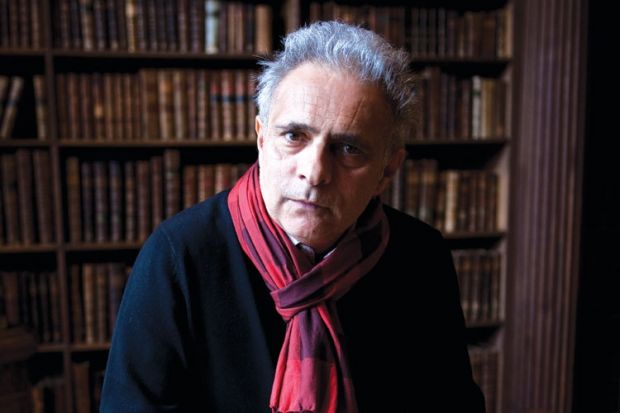Source: Getty
Award-winning author and playwright Hanif Kureishi, famous for novels such as The Buddha of Suburbia and the screenplay for the film My Beautiful Laundrette, was last month made a professor at Kingston University, where he was already a writer-in-residence.
When and where were you born?
I was born in the suburbs; it’s all on the internet, this [Bromley, 5 December 1954].
How has this shaped you?
It would do, wouldn’t it? I don’t know; you’d better read my books.
Have you ever had a eureka moment?
[On writing] You look for that all the time when you’re working to[wards] a new idea. You get stuck with a story, then you think…that should happen – what you call a eureka moment – and it moves on a bit. Then you have another idea.
What advice would you give your younger self?
I’m not sure advice is any use to anybody, really. I was talking to a student this morning and I thought they had to see [the point I was making to them] themselves. I could sit there and talk until I’m blue in the face but until they see it themselves there’s no point. It’s like telling someone they’re an alcoholic. It doesn’t make the slightest bit of difference to them, but then there may be a day when they realise that this behaviour has to stop.
When did you want to become an author? Was it something you tripped into?
Yeah, when I was a teenager. I thought it might be a good job. It didn’t occur to me until much later that it was a daft thing to do.
When did it occur to you it might be a daft thing?
Last week. I just thought: it’s very difficult to make a living for your whole life as an artist.
On that note, is there anything you regret in your life?
Lots of things, but I’m not telling you.
What is an undergraduate degree worth?
I only teach MAs and PhDs, but I think an [undergraduate] degree in creative writing is totally worthless. There’s no guarantee that if you have a degree, that you’re an artist, that you can write. It’s [simply] a good opportunity for students to meet teachers. I mean, giving someone a [creative writing] degree, you might as well give them a swimming certificate – it doesn’t guarantee that your [work] is of any value, or that there will be any audience. That depends on the market.
…specifically for creative writing courses or other degrees?
No, I wouldn’t say this was the case with say…physics, because there’s a real body of information. With creative writing, writing in the end is really a matter of taste.
The protagonist in the film Le Week-End is an academic; do academics make good fictional characters?
Yes, they make fantastic characters because they’re thoughtful – if you’re lucky. They’ve devoted their life to instructing others, which seems to me to be a worthwhile thing to do.
You’re a busy writer (and now teacher): what do you do to relax?
I’ve got kids; that’s what I’ve been doing for the last few years – looking after my kids. It’s really fun; I really like doing it.
Would you consider giving up writing to solely focus on parenting?
Well, I’ve got to support them, haven’t I?
Is there anyone from history you’d like to meet?
I don’t know; I’ve not really thought about it. You mean [someone] like Leonardo da Vinci?
…someone who you might have wanted to have met or had a conversation with…
I can’t believe you can’t think of better questions than this dude, I really can’t.
Well, I think I’ve got everything I need, thank you.
OK, all right, bye.
Appointments
Jayne Mitchell, currently director of research, development and partnerships at the Quality Assurance Agency for Higher Education, has been appointed deputy vice-chancellor of Bishop Grosseteste University.
The University of Surrey has promoted Tom Ormerod, professor of cognitive psychology, to the position of associate dean for research within the Faculty of Arts and Human Sciences.
Wayne Powell, director of Aberystwyth University’s Institute of Biological, Environmental and Rural Sciences, has been named chief science officer of the CGIAR Consortium – an international organisation that supports agricultural research for a food-secure future.
Lady Keswick, former executive director of the Centre for Policy Studies and special adviser to Cabinet minister Kenneth Clarke, has been appointed chancellor of the University of Buckingham.
The vice-chancellors of the universities of York and Hull have appointed Trevor Sheldon dean of Hull York Medical School. Professor Sheldon had been serving as interim dean.
Sir Christopher Bayly will join the School of History at Queen Mary, University of London in September 2014. Professor Bayly is currently Vere Harmsworth professor of imperial and naval history at the University of Cambridge.
Register to continue
Why register?
- Registration is free and only takes a moment
- Once registered, you can read 3 articles a month
- Sign up for our newsletter
Subscribe
Or subscribe for unlimited access to:
- Unlimited access to news, views, insights & reviews
- Digital editions
- Digital access to THE’s university and college rankings analysis
Already registered or a current subscriber? Login
